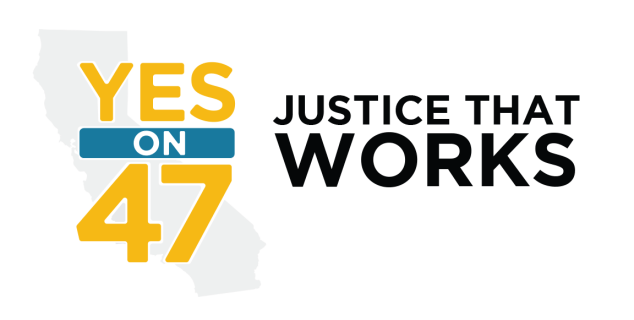Abuse at the hands of law enforcement has been making headlines as of late. From Oakland to Ferguson to Iguala, communities _domestically and abroad— have been coming together to scream “¡ya basta!” to police brutality. But there is another kind of abuse at the hands of law enforcement that rarely occupies the public discourse but is responsible for thousands of Black and Latino men being taken from their families: the draconian system of heavy-handed prosecution and mandatory sentencing. Today, a California ballot initiative offers common-sense reforms to begin to address the regime that targets Black and Brown men, and in time, bring our brothers home.
Generally, misdemeanors are punishable by one year or less in a county jail, whereas felonies typically carry one year or more in state prison or a death sentence. In addition to harsher sentences, felony convictions are associated with catastrophic disenfranchisement. Michelle Alexander likens the ramifications to the legacies of Jim Crow: convicted felons are stripped of their right to vote, participate in juries, and obtain employment without discrimination. For individuals who lack legal status, the picture is far more drastic; convictions that carry a year or longer prison sentence often result in deportation and permanent expulsion.
Because of the seriousness of a felony conviction, the classification has been historically reserved for the most serious (mostly violent) offenses. But as California’s system stands now, prosecutors are able to charge a gamut of nonviolent offenses as prison-sentence-carrying felonies, and they do it routinely. This is one of the reasons California’s prisons are so overcrowded —150 to 180 percent over capacity that the Supreme Court has ordered California to lower its prison population. Black and Latino folks represent 29 and 41 percent of that total prison population respectively, over two-thirds of the state prison population combined. Incarceration costs taxpayers roughly $49,000 per year, per individual.
This November, there is a measure on California’s ballot that mitigates some of the impacts of the system as it currently stands. Proposition 47 would reduce the classification of most “non-serious and nonviolent property and drug crimes” from felonies to misdemeanors unless an individual otherwise eligible for the reduction has prior convictions for murder, rape, certain sex offenses or certain gun crimes. The offenses eligible for the reduction include: shoplifting, writing a bad check, and personal use of most drugs, among others. Individuals currently serving prison sentences for qualifying felony convictions would be eligible for re-sentencing fit for misdemeanor convictions. Because the changes would go into effect on November 5, thousands of currently (and almost) filed complaints for qualifying felonies would have to be revisited by prosecutors statewide.
Because of the demographics of our prison populace, it is the fathers, brothers, and sons missing from Latino and Black families who would be entitled to reductions and re- sentencing. This, of course, means less serious convictions, less disenfranchisement and shorter sentences for our family members. Not to mention it would bring them closer to home—albeit in the context of local custody or probation.
Moreover, the astronomical amount of money saved —a projected $150 to $250 million per year— as a result of the reductions and re-sentencing would be reinvested in our communities. The savings would be applied towards the Safe Neighborhoods and Schools Fund, which would distribute funds to K-12 schools, mental health and drug treatment programs, and victims’ funds. It is no wonder why Proposition 47 was authored by San Francisco District Attorney George Gascón and San Diego’s former Police Chief William Lansdowne.
The focus is clear: let us make our communities safer by decreasing spending on reactionary punishment and increasing focus on true solutions: prevention and treatment to keep our families together and bring our brothers home.
***
Monika Yvette Langarica is a Chicana from southeast San Diego who graduated from U.C. Berkeley School of Law and the University of Southern California. She is currently working at a Public Defender’s Office in southern California. You can follow Monika on Twitter @mylangarica.






